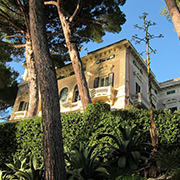Johannes Brahms composed some works in the summer holidays. Dvorák, Honegger and Krenek were railway enthusiasts. Charlotte Seither also travels a lot. She has just recently returned from a stay at the Fondazione Bogliasco in Italy. Is there an art to being creative whilst you’re on your travels? Michael Töpel put some questions to the composer.
What sort of a “creative harvest” were you able to experience at the end of 2015 in Liguria? Who invited you there and what will most stay in your memory about this?
Charlotte Seither: the Fondazione Bogliasco, a foundation based in New York, which runs a study programme for art and literature on the Ligurian coast, invited me. Ten fellows from different countries live in an impressive villa right by the sea. What I found exciting was the American tradition of evening dinners, at which the scholarship holders – the men in ties, the women smartly dressed – had a sophisticated evening meal together with a butler in the room. During these dinners I learnt a great deal about the American college culture, particularly about their wonderful culture of communication.
When you’re at home everything is ready for you to write. What do you expect and what do you need as a creative person elsewhere?
I am often aware that external surroundings sometimes don’t play such a big role. I can compose in the train, at a desk in the Deutsche Bahn lounge, or in a hotel room, if I have a pencil and rubber, the right music manuscript paper and a good base I can rest my paper on, but above all, the right inner pressure. And separately from that, there are of course places which have a tremendous imaginative power because they connect you with nature. In Bogliasco when I was working, I looked out directly onto the sea. That made a very strong impression.
Being creative elsewhere: is it the possibility of being able to use a kind of island of time to write which attracts you, or do you enjoy above all the happiness, the lightness, of temporarily being far away from some aspects of daily life which otherwise whisper to you “deal with me”?
Both. I experience the “being de-contextualized” at a distance as very stimulating, particularly when it’s also combined with another language. When I speak Italian all day, I think differently. I like it very much when the external circumstances also change – the landscape, the people, language, food, home, communication, and I’m happy to be open to other factors. It’s also often very valuable to have a particular aim in mind, to think to yourself: in these four weeks I want to complete this and that.
Do you believe in inspiring places or surroundings, where creative decisions arise from stimulating travels or decisions already made are changed through new surroundings?
Yes. There are places which “absorb” you and in which you become part of nature. Forest, sea, mountains – these already radiate a tremendous power. And irrespective of that, many of the titles of my works have arisen directly in connection with the place where a work is composed. I wrote L‘uno dall‘altro for orchestra in Venice. The string trio from Bogliasco will be called Dove vai? But also, after a scholarship stay, the “flavour” of a region sometimes remains for a long time afterwards. Seeds of noises was composed in Los Angeles. It’s really nice to always (inwardly) combine particular pieces with the places where they were composed. But the personal contacts are often much more important. You discuss with colleagues and gain new intellectual approaches which you wouldn’t necessarily get from your own metier. In Bogliasco I drew a lot of inspiration from the very reflective work of a New York choreographer of modern dance. Who knows what might come of it one day ...
(from [t]akte 1/2015 – translation: Elizabeth Robinson)



